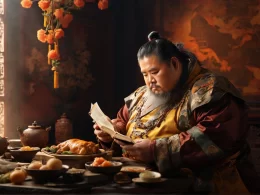Idiom Explanation:
尔虞我诈:I cheat you and you cheat me, indicating that they cheat each other.
Pronunciation:
尔虞我诈
ěr yú wǒ zhà
Origin:
春秋·左丘明《左传·宣公十五年》:华元为质。盟曰:“我无尔诈,尔无我虞。”
Story:
In the middle of the Spring and Autumn Period in China, Chu was a hegemonic state in the Central Plains, and King Chu Zhuang did not regard the small neighboring states at all.
On one occasion, he sent his great official Shen Zhou on a mission to Qi, instructing him that when he passed through Song, it was unnecessary to borrow a road from it. Shen Zhou reckoned that if he did so, he would surely anger Song and might be killed for it. But King Chuang insisted that he do so, and assured him that if he was killed by Song, he himself would send troops to crush Song and avenge his death. Shen Zhou had no choice but to entrust his son Shen Hsiang (xi) to King Chu Zhuang and set out.
As expected by Shen Zhou, he passed through Song and was caught by Song because he did not lend his way. When Hua Yuan, the ruling minister of Song, understood the situation, he was very angry with King Chu Zhuang for being so rude and said to Duke Wen of Song: "Passing through our Song without informing us is treating Song as a vassal state. To be a vassal state is the same as to die. If we kill the emissary of Chu, and Chu comes to invade us, we will only lose our kingdom. Instead of that, we should kill the Chu ambassador!" Duke Wen of Song took Hua Yuan's advice and ordered Shen Zhou to be killed.
When the news of Shen Zhou's murder reached Chu, King Chu Zhuang was so angry that he didn't have time to put on his shoes or hang up his sword, and ordered an invasion of Song. However, it was not easy to destroy the state of Song even though it was small. King Chu Zhuang sent his troops in the autumn of 595 B.C., and continued the siege until the following summer, but he still failed to bring down the capital of Song. The King of Chu was so demoralized that he decided to break the siege and return to his country.
When Shen Hsiang, son of Shen Zhou, learned of this, he bowed down before King Zhuang's horse and said, "My father knew he would die at that time, but he dared not disobey your order. Now, you have thrown away what you said before." When King Chu Zhuang heard this, he could not answer. At that time, Shen Shushi, a great official who was driving for King Chu Zhuang, offered a suggestion: "We can let the soldiers build houses and plant fields here and pretend to stay for a long time. In this way, Song would surrender out of fear." King Chuang adopted Shen Shushi's plan and carried it out. The people of Song were indeed afraid when they saw it. Hua Yuan encouraged the soldiers and people defending the city to rather die in battle and starve than to surrender.
Late one night, Huayuan sneaked into the camp of the Chu army and entered the tent of the commander of the Chu army, Zi Hui, and went up to his couch and called him up, saying, "Our king asked me to tell you the present plight of the state of Song: the food and straw have been eaten up and everyone has exchanged their dead children for food. We have already burned up all the firewood, and we are using the bones of dismembered corpses as firewood. In spite of all this, you want to force us to make an insulting alliance, but we would rather perish than accept it. If you can retreat thirty miles, then I will do whatever you command!"
Zi-an was so frightened at these words that he first made a private agreement with Huayuan on the spot, and then reported it to King Chu Zhuang. King Chu Zhuang wanted to withdraw his troops, so he agreed. On the next day, King Chu Zhuang ordered the Chu army to retreat 30 miles. Thus, peace was restored between Song and Chu. Hua Yuan went to the Chu camp and made a covenant and went to Chu as a hostage. The covenant read, "I have no guile from you, and you have no danger from me." It means, "I will not deceive you, and you need not guard against me!"
Similar Idioms:
- 钩心斗角
- 尔诈我虞












